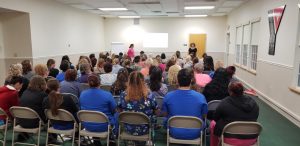
Childhood Trauma
Childhood trauma can impact a child’s behaviors as well as their long-term mental and physical health outcomes. It is a myth that young children aren’t affected by trauma because they were too young to understand/don’t talk about it.
“Trauma results from an event, series of events, or set of circumstances that is experienced by an individual as physically and emotionally harmful or threatening and that has lasting adverse effects on the individual’s physical, social, emotional, or spiritual well-being.” (SAMSHA, 2012)
The research shows that the higher incidence of childhood trauma, including divorce, abuse, separation, economic hardship, drug or alcohol use in the home or violence, the more likely the person is to have health issues as an adult such as alcoholism, drug abuse, depression, suicide, poor physical health, and obesity.
Nadine Burke Harris’s TED talk video, “How Childhood Trauma Affects Health Across a Lifetime” is a great introduction to this topic. The US DHHS’s Substance Abuse and Mental Health Services Administration agency’s ACEs webpage has more information about the Adverse Childhood Experiences study.
Presentation to ECCS
Carol O’Connor, LCSW, Senior Project Coordinator at the Child Health and Development Institute (CHDI) and National TF-CBT Trainer, gave a presentation to the ECCS community on September 12, 2018.
Here are the slides and handouts:
Impact of Childhood Trauma Presentation to ECCS (PDF)
Trauma resources list for ECCS (PDF)
NCTSN Trauma and Your Family – handout (PDF)
This workshop is funded by a grant from the Petit Family Foundation.
National Child Traumatic Stress Network’s 12 Core Concepts of Trauma
- Traumatic experiences are inherently complex
- Trauma occurs within a broad context
- Traumatic events often generate secondary adversities
- Children can exhibit a wide range of reactions to trauma and loss
- Danger and safety are core concerns in the lives of traumatized children
- Traumatic experiences affect the family and broader caregiver systems
- Protective and promotive factors can reduce the adverse impact of trauma
- Trauma and post-trauma adversities can strongly influence development
- Developmental neurobiology underlies children’s reactions to traumatic experiences
- Culture is closely interwoven with traumatic experiences, response and recovery
- Challenges to the social contract, including legal land ethical issues, affect trauma response and recovery
- Working with trauma- exposed children can evoke distress in providers that makes it more difficult for them to provide good care.
When a child is misbehaving or an adult is struggling, consider looking at the situation through a trauma lens and change the conversation from “What is wrong with you?” to “What happened to you?”

